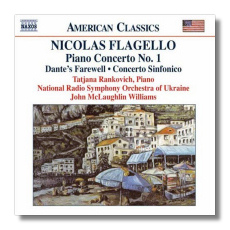
The Internet's Premier Classical Music Source
Related Links
- Flagello Reviews
- Latest Reviews
- More Reviews
-
By Composer
-
Collections
DVD & Blu-ray
Books
Concert Reviews
Articles/Interviews
Software
Audio
Search Amazon
Recommended Links
Site News
 CD Review
CD Review
Nicolas Flagello

- Piano Concerto #1 (1950)
- Dante's Farewell (1962, orch. Anthony Sbordini)
- Concerto Sinfonico for Saxophone Quartet & Orchestra (1985) *
Tatjana Rankovich, piano
Susan Gonzalez, soprano
* New Hudson Saxophone Quartet
National Radio Symphony of Ukraine/John McLaughlin Williams
* Rutgers Symphony Orchestra/Kynan Johns
Naxos 8.559296
Those familiar with the music of the late Nicolas Flagello are aware that he was an arch-conservative at a time when Cage, Boulez, Stockhausen, Ligeti, Berio and others had struck out new paths in music, paths not just avant garde in sound, but so revolutionary as to almost redefine music. Every member of the latter group failed to reach large audiences, but Flagello, still a rather neglected figure himself, both in his native United States and abroad, has been gaining currency of late, and this release of his First Piano Concerto and other works may further help to champion his cause.
To me, the Flagello First Concerto is the finest 'rediscovered' work I've encountered in years. It is a student effort, written as an essential exercise for a Master's degree at the Manhattan School of Music. It was performed in 1950 by pianist Joseph Seiger, with the composer conducting the school orchestra. It has since been totally neglected, unaccountably, I might add. The excellent album notes, by veteran musicologist and critic Walter Simmons, inform us this is the first time the work has been performed since its 1950 première.
The Concerto shows the influence of Rachmaninoff, especially in the sprawling first movement. Oddly, the piano's dramatic entry recalls the opening of the MacDowell First, probably more a coincidence since little else in the work divulges anything related to the music of that American composer. There are also hints of Bartók here too, especially from the Third Piano Concerto, which was a new work at the time Flagello was composing this concerto.
The Flagello First contains several quite attractive themes and features a big, powerful first movement, with a lengthy, challenging Lisztian cadenza. The opening panel is longer than the two subsequent movements combined. Some might charge it is overlong, though it holds together quite well and held my interest through all three listenings. The ensuing and quite lovely Andante and brilliant Allegro con brio movements, each of six or seven minutes in duration, are also quite convincing.
Belgrade-born, U.S.-based pianist Tatjana Rankovich plays brilliantly throughout and conductor Williams leads the Ukrainian ensemble with a knowing sense for the composer's style. For those who like piano concertos in an unabashedly post-Romantic vein, this will prove a splendid find. Maybe I think the work is better than it actually is, but I don't think so. It certainly deserves attention, even if it contains flaws and was hardly adventurous for its time. I'm wondering now whether other pianists will take up this worthwhile concerto.
The other works, Dante's Farewell, and the Concerto Sinfonico, are more mature and warrant attention as well, with the latter piece the more substantial. The New Hudson Saxophone Quartet perform the work with an appropriate darkness, their sounds sensuous and lithe to contrast with the often powerful, quasi-bombastic character of the orchestra. Flagello's writing for the saxophones is imaginative and imparts a more serious and deeper sense to the instrument – an instrument that has in the past, let's face it, been associated with the sordid, the sexy and the shallow, especially in film scores. The Rutgers Symphony plays quite well, by the way, and their insightful conductor here, Kynan Johns, must be given a good measure of the credit.
Dante's Farewell is another dark work and quite successful in the performance here, with soprano Susan Gonzalez delivering an appropriately intense performance. She has a powerful voice, perhaps sometimes reaching nearly piercing, over-the-top levels. Still, the performance is a fine one. The sound on all works is excellent. Strongly recommended.
Copyright © 2006, Robert Cummings





















